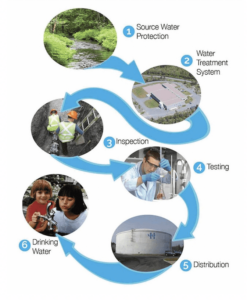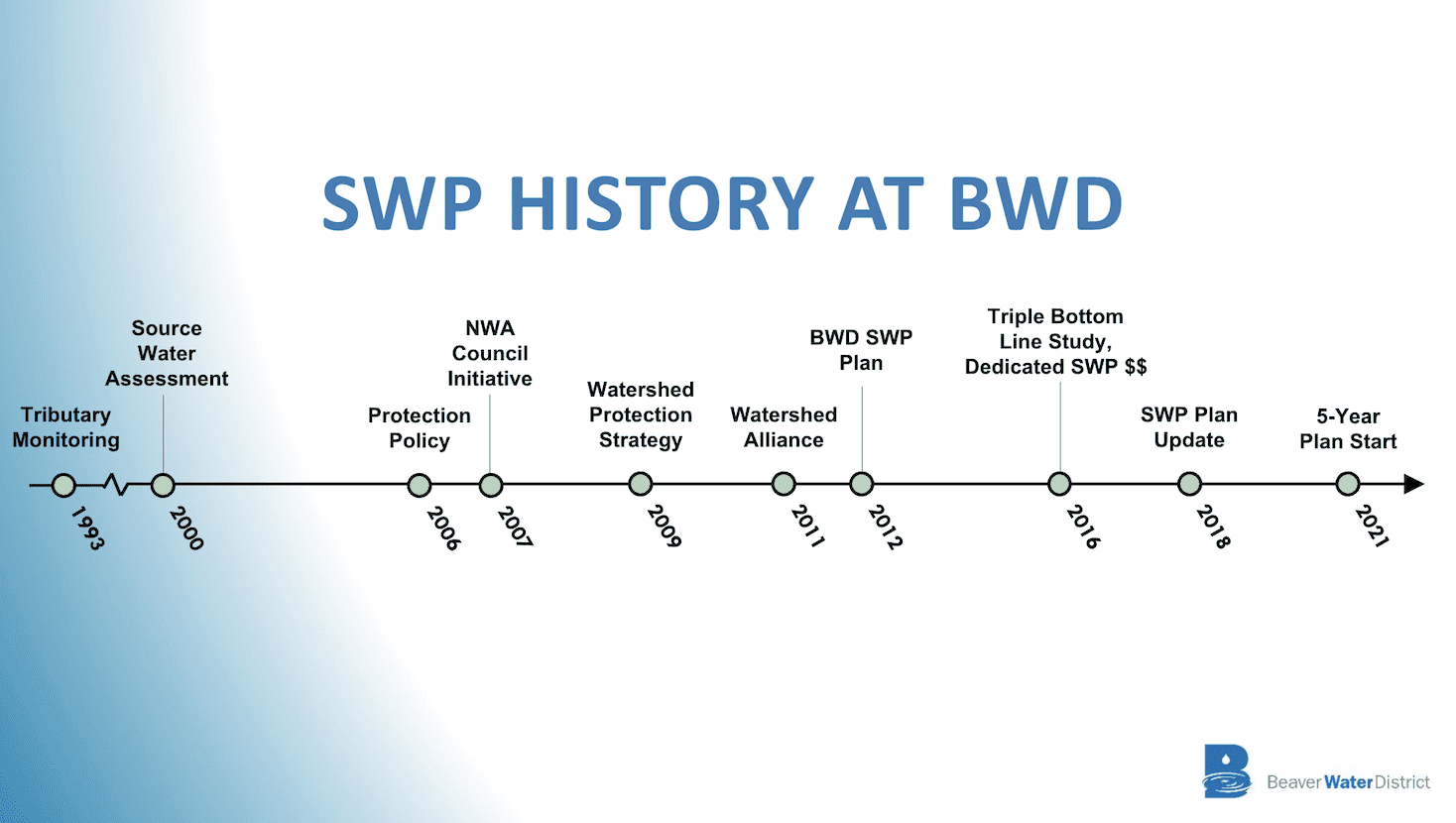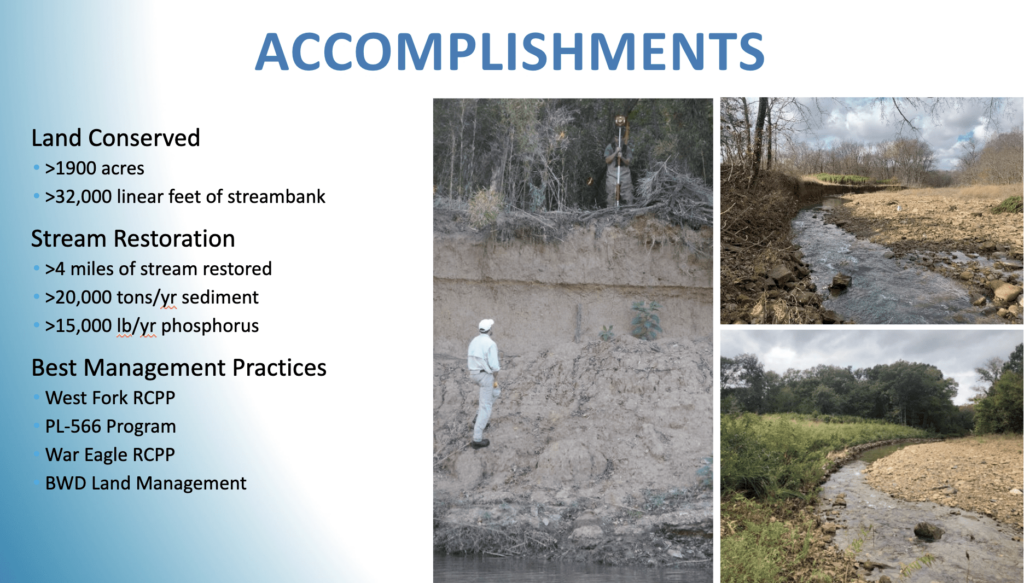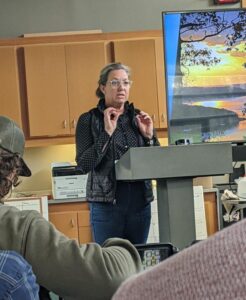April Monthly Meeting Recap:
Our 2023 April Monthly Meeting was held at 7:30 a.m. at the Watershed Center.
James McCarty, PhD., P.E., Environmental Quality Manager with Beaver Water District, presented on the Source Water Protection efforts in Northwest Arkansas.
Mr. McCarty introduced the Beaver Water District as the water wholesaler for Bentonville, Fayetteville, and Rogers, Arkansas, which the Northwest Arkansas Council founded. The district operates a 28,000-acre lake producing sixty-six to sixty-seven million gallons of water daily. As production increases, they are working to obtain more storage rights for the future.
He explained the components of Beaver  Water District’s Multi Barrier Approach to Drinking Water management:
Water District’s Multi Barrier Approach to Drinking Water management:
- Source Water Protection
- Water Treatment System
- Inspection
- Testing
- Distribution
- Drinking Water
Mr. McCarty explained the importance of source water quality in correlation to filter clogging events, taste and odor issues, disinfection, and harmful algal blooms, all with algae as the common thread. Mr. McCarty illustrated these threats through the example of Lake Erie, where bloom toxins caused a four-day shutdown of the local drinking water treatment plant. He identified factors impacting algal growth and described nutrients as a focal point for Beaver Lake operations. With the region’s population projected to double from half a million residents to one million, the district is working to identify threats to water source degradation.
Source Water Protection proves valuable by focusing on treatment, capital improvement, and a triple-bottom-line sustainability approach. Source Water protections provide
- water quality for other uses
- aesthetic value
- environmental stewardship
- improved relations with upstream neighbors and the larger community.
McCarty showed a timeline of the Source Water Protection efforts at Beaver Water District and shared priorities and considerations that have taken shape throughout the process, including a five-year plan created by Mr. McCarty in 2021.

The plan focuses on stream restoration, land owner best management practices, and land conservation and has seen success so far with almost 2,000 acres of land conserved, over four miles of stream restored, and programs at West Fork and War Eagle areas. He went on to discuss its funding and main partners; the Beaver Watershed Alliance, Northwest Arkansas Land Trust, and Watershed Conservation Resource Center. He said four cents of every 1,000 gallons of water sold is allocated toward Source Water Protection Initiatives. To employ protections and encourage best management practices such as forestry and pond systems, the district pairs government assistance, such as the Regional Conservation Partnership Program (RCPP), with public partner support. The Beaver Water District was also the first in the nation to utilize the Public Law Program (PL566) for stream restoration with a twenty-five percent public partner match.
He went on to discuss its funding and main partners; the Beaver Watershed Alliance, Northwest Arkansas Land Trust, and Watershed Conservation Resource Center. He said four cents of every 1,000 gallons of water sold is allocated toward Source Water Protection Initiatives. To employ protections and encourage best management practices such as forestry and pond systems, the district pairs government assistance, such as the Regional Conservation Partnership Program (RCPP), with public partner support. The Beaver Water District was also the first in the nation to utilize the Public Law Program (PL566) for stream restoration with a twenty-five percent public partner match.
Natural Resources Conservation Service Update,  Diana Sheridan: Reported a huge leap in funding with the Inflation Red-Act funds, the first time NRCS has received funding outside of the farm bill. These funds must be allocated through the fiscal year 2031 and focus on climate-smart practices such as nutrient management, seedings, and carbon sequestering forestry plans, a small component of conservation projects in RCPP, and the Environmental Quality Incentives Program (EQIP).
Diana Sheridan: Reported a huge leap in funding with the Inflation Red-Act funds, the first time NRCS has received funding outside of the farm bill. These funds must be allocated through the fiscal year 2031 and focus on climate-smart practices such as nutrient management, seedings, and carbon sequestering forestry plans, a small component of conservation projects in RCPP, and the Environmental Quality Incentives Program (EQIP).
Diana explained the “act now authority” in use, allowing landowners who agree to plant native grasses and fescue to be approved in three to eight weeks rather than six months to a year. She went on to describe the benefits of EQIP Conservation Incentive Contracts that give five years of management instead of one, the Little Sac RCPP being one example. Diana said deadlines for Conservation Stewardship Program applications are approaching on April 21st and June 9th. She also shared that around $200,000 of pre-approved RCPP projects are ready for launch, focused on grazing and forestry. Lastly, Diana announced a new hire, Gorman Bennet, as Conservation Specialist with the NRCS.
Regional Issues — John with the United States Geological Survey said that water science centers for Missouri, Illinois, and Iowa have merged and that the nine basins across the U.S. are focused on nutrients. Hannah Wilson with BassPro announced their new Community Canoe Fleet. Todd Wilkinson said volunteers are needed for their Earth Day paddle cleanup at Springfield Lake, and folks can sign up on the James River Basin Partnership website. James River Basin Partnership announced that the Upper James 319 program was approved and described the Septic Improvement Program in partnership with Missouri Smallflows, Watershed Committee, and H2Ozarks, which will replace ten to fifteen systems in the region. A representative from the City of Springfield reported that the Clean Green Program has thirty additional stream clean-ups this season.
Other Business
Diana Sheridan said Morel mushrooms emerged in her yard, and the crowd rejoiced!

